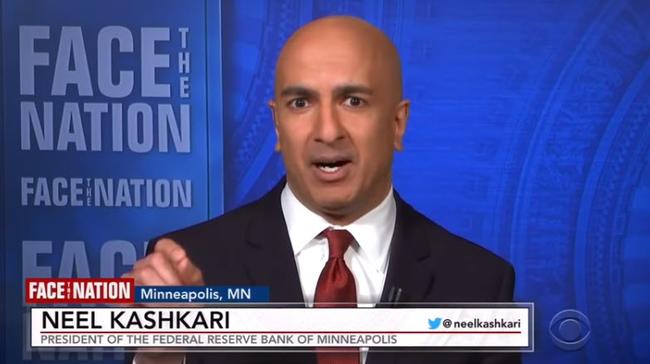Kashkari Says Only Way To "Save Economy" Is To Lock It Down "Really Hard" For 6 Weeks Tyler Durden Mon, 08/03/2020 - 14:35
With Shepard Ambellas of Intellihub
Minneapolis Fed President (as well as former Assistant Secretary of the Treasury for Financial Stability under the Bush and Obama administrations, former PIMCO and former Goldman Sachs employee) Neel Kashkari said the only way to save American lives from COVID-19 is to fully lock down the entire nation and all of its inhabitants.
“That’s the only way we’re really going to have a real robust economic recovery,” the American banker told CBS’s Face the Nation. “Otherwise, we’re going to have flare-ups, lockdowns, and a very halting recovery with many more job losses and many more bankruptcies for an extended period of time, unfortunately.”
Kashkari said that the path of the economy would hinge on success in getting the pandemic under control, and suggested that while very unpopular, a stringent economic lockdown might be the lesser of two evils to more quickly restore growth and hiring, rather than waiting for the eventual arrival of a vaccine.
"I mean if we were to lock down really hard, I know I hate to even suggest it, people will be frustrated by it, but if we were to lock down hard for a month or six weeks, we could get the case count down so that our testing and our contact tracing was actually enough to control it the way that it’s happening in the Northeast right now”, Kaskhari said.
However, the truth of the matter is that the Federal Reserve banker just wishes to secure another stimulus package bailout for the Fed worth trillions of dollars in a last-ditch effort to prop up the economy one last time before it becomes fully blown out.
To top it all off, Kashkari believes he can convince the general public that having their businesses shut down and forcing people to stay at home with no pay will somehow get the economy bustling again when in all actuality the diabolic plan makes no sense and even JPMorgan now advising against a broad lockdown, to wit:
In our opinion, re-imposing city lockdowns at this stage might be not be the ideal solution to control infection, from a cost/ benefit perspective, especially for developed countries. Even for developing countries, an overall cost-benefit analysis indicates that, in a potentially bigger second wave, lockdowns may not be the ideal approach.
Even Bloomberg admits a new shutdown woutd be catastrohic, with strategist Richard Jones writing that "fresh lockdowns would hurt risk assets in a big way and would test the limits of policy makers’ capacity to enact fiscal and monetary stimulus."
This will be bad news for equities in general, but it could be that the outperfomers during the initial economic shutdown would do so again (eg, tech, basic staples). In order for this to happen, however, it would require another round of unprecedented policy responses.
For the Fed and BOE, the markets would probably look to price negative policy rates more aggressively, and lots more QE. For the ECB, QE expectations would also ramp higher, and lower policy rates could not be ruled out either. On the fiscal side, spending of a similar magnitude of what already was conducted would likely be needed again.
Which appears to be precisely what the Fed wants: another tsunami of liquidity following a second self-inflicted suicide of the economy.
The bottom line is, the Fed - which after failing catastrophically at hitting its inflation objective has now switched to being an expert in such matters as climate change and racial inequality - is setting the stage for another multi-trillion-dollar bailout which would be promptly catalyzed by another economic shutdown, which in turn would set the stage for the next major economic crisis, one in which as discussed yesterday, the Fed would proceed to send money directly to US households, sparking a long-overdue inflationary conflagration.
http://dlvr.it/Rcwhxd

No comments:
Post a Comment